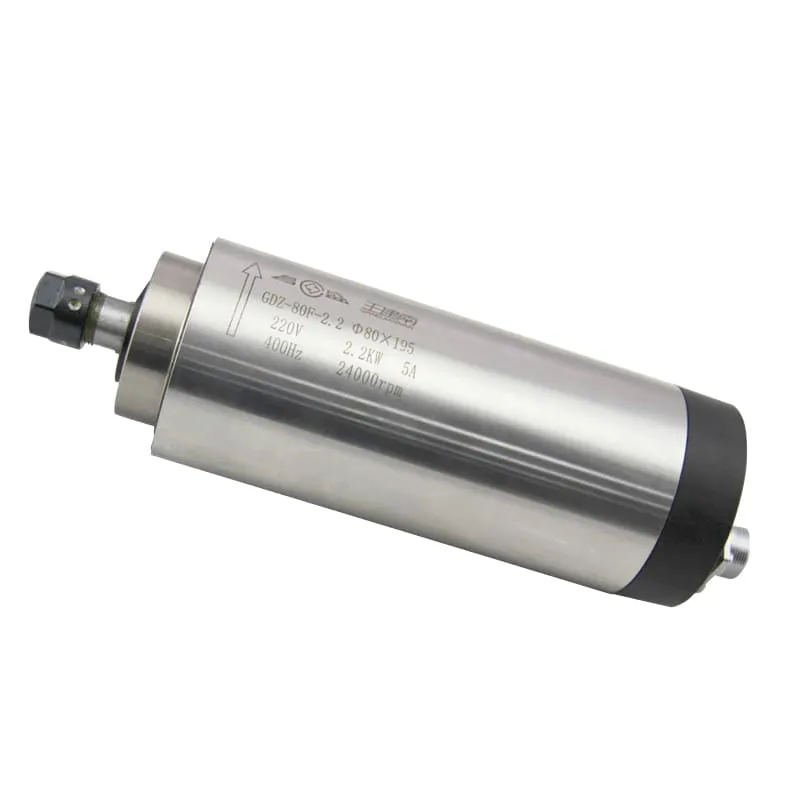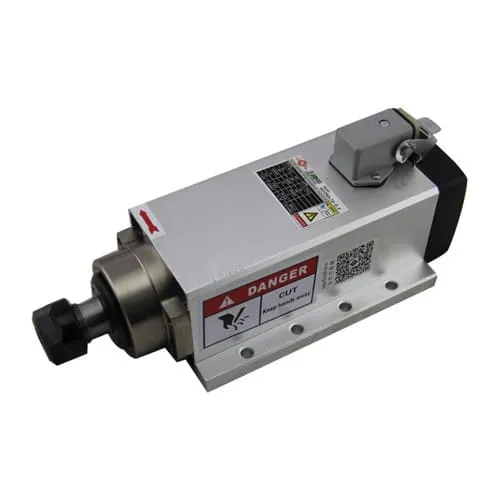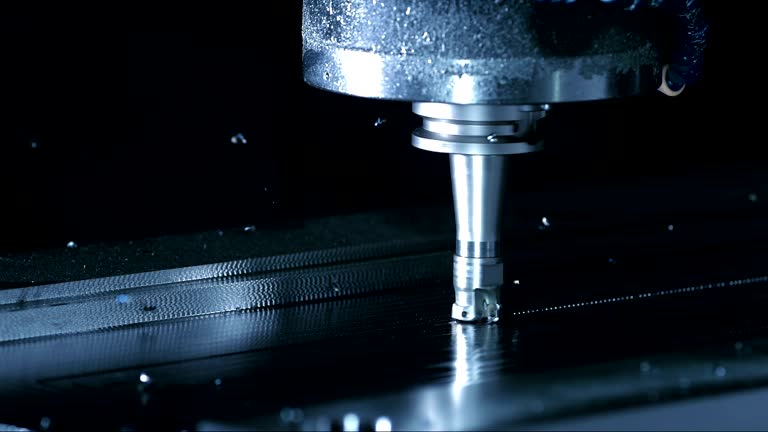How long is CNC machinist training?
CNC machinist training is a journey that opens doors to a world of precision manufacturing and technological innovation. Whether you’re considering a career change or looking to enhance your skills in the machining industry, understanding the timeline for CNC machinist training is crucial. In this comprehensive guide, we’ll explore the various aspects of CNC machinist training and provide insights into how long you can expect your educational journey to last.
Understanding the Basics of CNC Machining
Before diving into the training timeline, it’s essential to grasp what CNC machining entails. CNC stands for Computer Numerical Control, and it involves using computers to control machine tools. CNC machinists are skilled professionals who operate these high-tech machines to create precision parts for various industries.

At the heart of CNC machines are spindle motors, like the 2.2KW ER16 Air-Cooled Spindle, which provide the rotational force necessary for cutting and shaping materials. Understanding these components is a crucial part of CNC machinist training.
The Typical Timeline for CNC Machinist Training
The duration of CNC machinist training can vary widely depending on several factors:
- Educational path chosen
- Prior experience in machining or related fields
- Intensity of the training program
- Individual learning pace
Here’s a general overview of the typical timelines for different training approaches:
- Certificate Programs: 6 months to 1 year
- Associate Degree: 2 years
- Apprenticeship Programs: 3 to 4 years
- On-the-job Training: Varies, but typically 1 to 2 years for basic proficiency
Certificate Programs: The Fast Track to CNC Machining
Certificate programs offer a quick entry into the world of CNC machining. These programs typically focus on:
- Basic machining principles
- CNC programming fundamentals
- CAD/CAM software operation
- Safety procedures
With a duration of 6 months to 1 year, certificate programs are ideal for those looking to quickly transition into the field or for individuals already working in manufacturing who want to upgrade their skills.
Associate Degree: A Comprehensive Approach
An associate degree in CNC machining or manufacturing technology provides a more in-depth education. Over the course of two years, students learn:
- Advanced CNC programming techniques
- Precision measurement and quality control
- Metallurgy and material science
- Machine maintenance and troubleshooting
This comprehensive approach not only prepares students for entry-level positions but also lays the groundwork for career advancement.
Apprenticeship Programs: Learning While Earning
Apprenticeship programs offer a unique blend of classroom instruction and on-the-job training. Lasting 3 to 4 years, these programs allow aspiring CNC machinists to:
- Gain hands-on experience with various machines
- Work alongside experienced professionals
- Earn a wage while learning
- Develop a strong network in the industry

During apprenticeships, trainees might work with a variety of equipment, including specialized spindles like the 2.2KW ER20 Square Air-Cooled Spindle with Flange, gaining practical knowledge of different machining setups.
On-the-job Training: Learning in the Real World
Some manufacturers offer on-the-job training for CNC machinists. This approach typically takes 1 to 2 years for an individual to reach basic proficiency. The timeline can vary based on:
- The complexity of parts being produced
- The types of machines used
- The individual’s aptitude and prior experience
On-the-job training often starts with simpler tasks and gradually progresses to more complex operations as the trainee gains experience.
Factors Affecting Training Duration
Several factors can influence how long it takes to become a proficient CNC machinist:
- Prior Experience: Those with a background in conventional machining may pick up CNC skills more quickly.
- Learning Ability: Individual aptitude for technical concepts can affect learning speed.
- Training Intensity: Full-time programs will naturally progress faster than part-time options.
- Technology Advancements: Keeping up with the latest CNC technologies may require ongoing training.
The Role of Specialization in Training Length
Specializing in specific areas of CNC machining can extend the training period but also lead to higher-paying positions. Some specializations include:
- Multi-axis machining
- Micro-machining
- High-speed machining
For example, learning to operate machines with high-speed spindles like the 60000RPM 300W ER8 Water-Cooled Spindle requires additional training due to the precision and speed involved.
Continuous Learning in CNC Machining
It’s important to note that learning in CNC machining doesn’t stop after initial training. The field is constantly evolving, with new technologies and techniques emerging regularly. Continuous learning is essential for CNC machinists to stay competitive in the job market.
The Importance of Hands-on Experience
While classroom learning is crucial, hands-on experience is invaluable in CNC machinist training. Programs that offer extensive practical training often produce more skilled and confident machinists. This is why apprenticeships and programs with internship components are highly valued in the industry.
Balancing Theory and Practice
A well-rounded CNC machinist training program should balance theoretical knowledge with practical skills. Here’s a typical breakdown:
| Theoretical Knowledge | Practical Skills |
|---|---|
| CNC programming | Machine operation |
| CAD/CAM software | Tool selection |
| Material science | Troubleshooting |
| Quality control | Workpiece setup |
Aim for programs that offer a good mix of both aspects for comprehensive learning.
The Role of Certification in CNC Machinist Training
While not always mandatory, certifications can enhance a CNC machinist’s credentials and potentially shorten the time needed to secure employment. Popular certifications include:
- NIMS (National Institute for Metalworking Skills) certifications
- MSSC (Manufacturing Skill Standards Council) certifications
- Haas Certification Program
These certifications typically require additional study and testing beyond basic training programs.
Adapting to Different CNC Machines
Part of CNC machinist training involves learning to work with various types of CNC machines. This might include:
- CNC mills
- CNC lathes
- Multi-axis machines
- EDM machines
Each machine type requires specific skills and knowledge, which can add to the overall training time.
The Impact of Technology on Training Duration
Advancements in CNC technology can both shorten and lengthen training times. While modern machines with user-friendly interfaces may be easier to learn initially, the complexity of advanced features can require additional training time to master.
Soft Skills in CNC Machinist Training
In addition to technical skills, CNC machinist training often includes developing soft skills such as:
- Problem-solving
- Communication
- Teamwork
- Attention to detail
These skills are crucial for success in the workplace and are typically developed throughout the training period.
The Financial Aspect of CNC Machinist Training
When considering how long CNC machinist training takes, it’s important to factor in the financial aspect. Longer programs like associate degrees may have a higher upfront cost but can lead to better-paying positions. Apprenticeships, on the other hand, allow trainees to earn while they learn, offsetting the opportunity cost of full-time education.
FAQs
1. Can I become a CNC machinist without formal training?
While it’s possible to learn on the job, formal training programs provide a structured approach to learning and can lead to faster career advancement. Most employers prefer candidates with some form of formal training or certification.
2. How long does it take to become proficient in CNC programming?
Basic proficiency in CNC programming can be achieved in 3-6 months of dedicated study. However, mastering complex programming techniques can take several years of practice and continuous learning.
3. Is online training for CNC machining effective?
Online training can be effective for learning theoretical concepts and CNC programming. However, hands-on experience with actual machines is crucial and typically requires in-person training or apprenticeships.
4. How often do CNC machinists need to update their skills?
CNC technology evolves rapidly, so machinists should plan on continuous learning throughout their careers. Many professionals engage in short courses or workshops every 1-2 years to stay current with new technologies and techniques.
5. What’s the difference in training time between 3-axis and 5-axis CNC machining?
While basic 3-axis machining can be learned in a few months, mastering 5-axis machining typically requires an additional 6-12 months of specialized training due to its increased complexity and the advanced programming skills required.
Conclusion
The journey to becoming a skilled CNC machinist is one of continuous learning and growth. While initial training can range from 6 months to 4 years depending on the chosen path, true mastery of the craft comes with years of experience and ongoing education.
For those passionate about precision manufacturing and technology, the time invested in CNC machinist training is well worth it. The field offers exciting opportunities to work with cutting-edge technology and contribute to the creation of products that shape our world.
Remember, the length of your training is just the beginning. The most successful CNC machinists are those who embrace lifelong learning, staying curious and adaptable in the face of technological advancements. Whether you’re just starting out or looking to enhance your skills, the world of CNC machining offers a rewarding career path for those willing to invest the time and effort into their training.
By understanding the various training options and timelines available, you can make an informed decision about your career path in CNC machining. Whether you choose a quick certificate program or a comprehensive apprenticeship, the skills you gain will open doors to a thriving industry that’s always in need of skilled professionals.

